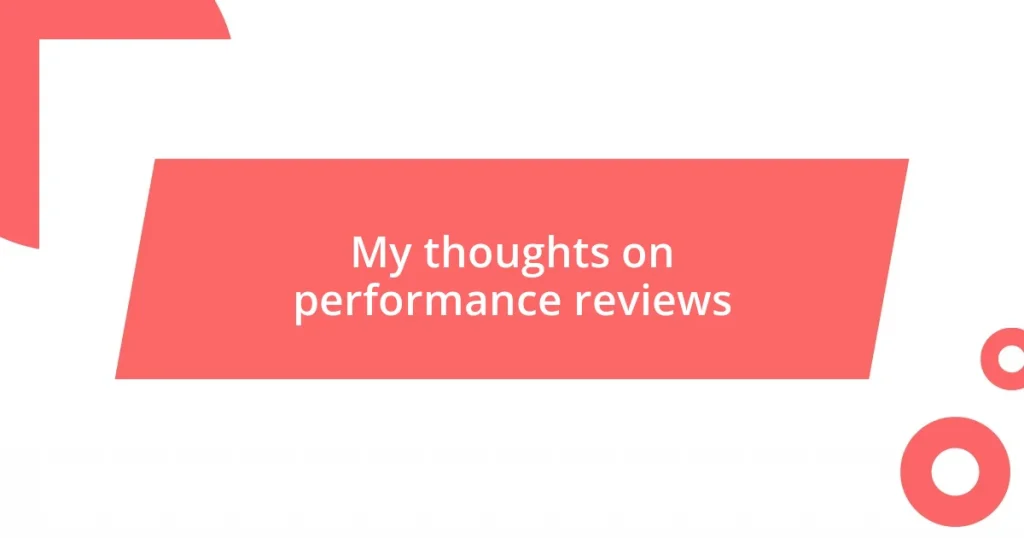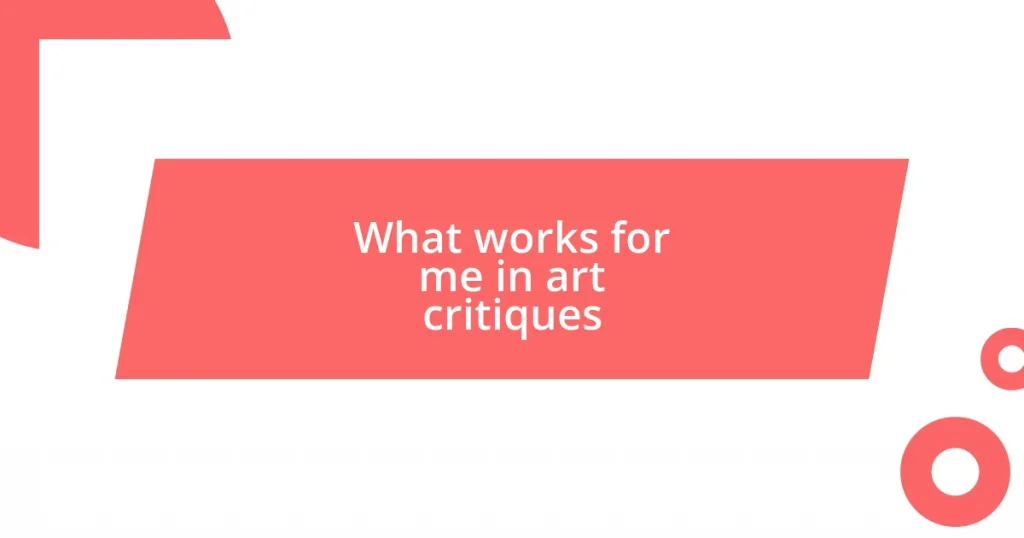Key takeaways:
- Performance reviews are crucial for feedback and career development, offering opportunities for dialogue between employees and management.
- Constructive feedback promotes self-awareness, improvement, communication, goal setting, and engagement, creating a cycle of continuous growth.
- Effective reviews require preparation, a supportive atmosphere, clear action items, and regular goal check-ins to ensure ongoing development and motivation.
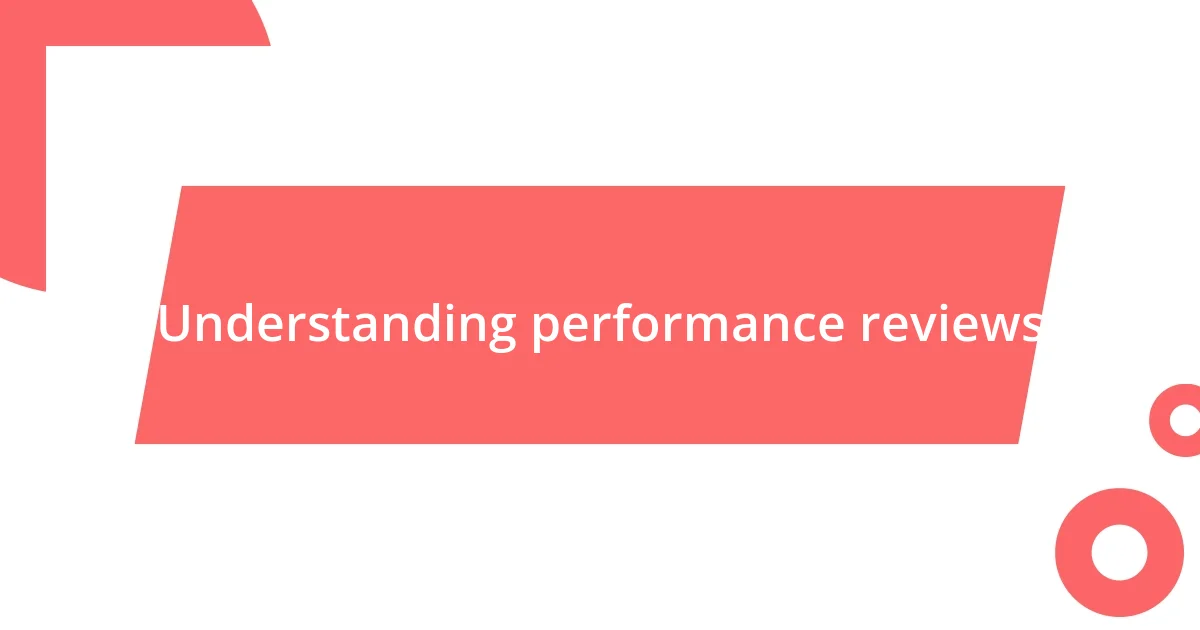
Understanding performance reviews
To truly understand performance reviews, it’s essential to recognize that they serve as a structured opportunity for feedback and growth. I remember my first review vividly—it felt daunting yet exciting. I walked in anxious, wondering if my contributions were valued. It was a pivotal moment where I realized these discussions are more than just paperwork; they can shape the trajectory of our careers.
Performance reviews often come with a mix of emotions, from apprehension to anticipation. Have you ever felt a knot in your stomach before one? I certainly did. However, over time, I learned that these reviews are essential for opening dialogue about strengths and areas for improvement. They can establish a mutual understanding between the employee and management, creating a collaborative effort towards personal and organizational growth.
Another aspect to consider is the variability of performance review processes. Some organizations adopt a formal structure, while others may have a more casual approach. I’ve experienced both, and each brought its own challenges. It’s crucial to adapt to the culture of your workplace to make the most of these reviews. Are they truly serving as a tool for development, or just a box to check off? Recognizing this distinction could dramatically influence how one approaches their career path.
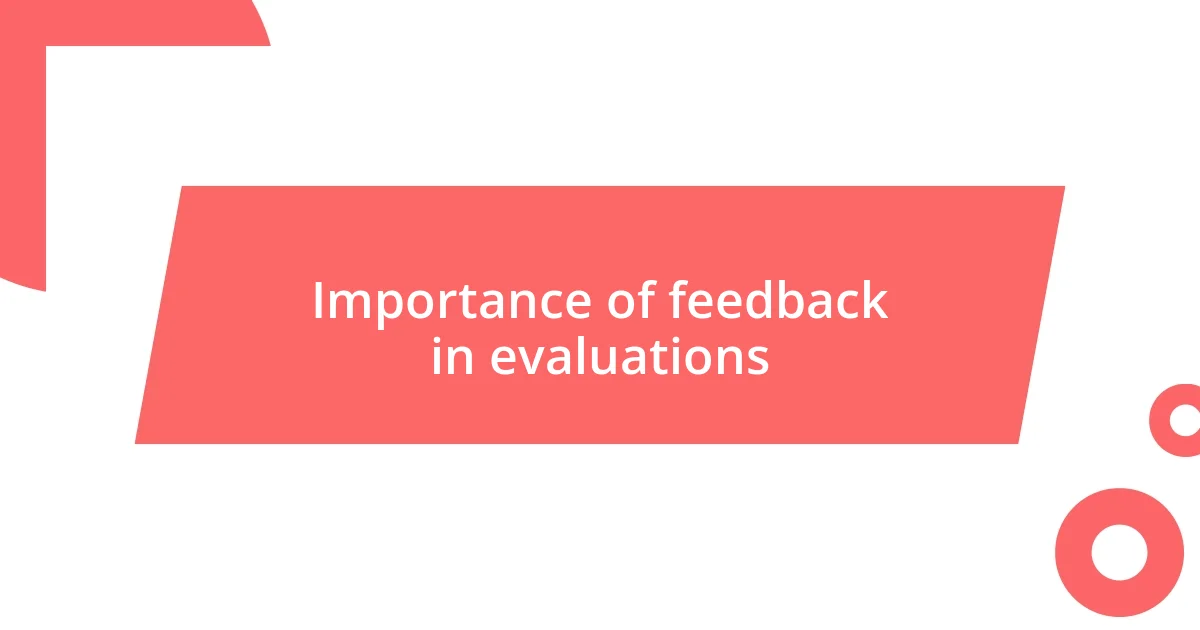
Importance of feedback in evaluations
Feedback is the backbone of evaluations. I can still recall a time when my manager shared constructive criticism about my project management skills. At first, I felt defensive, but that feedback opened my eyes to possibilities for growth. It encouraged me to seek out additional training and ultimately enhanced my proficiency. When feedback is genuinely offered, it transforms evaluations into unique opportunities for development rather than mere judgments.
Here’s why feedback matters in evaluations:
– Promotes Self-Awareness: Constructive feedback helps employees recognize their strengths and weaknesses.
– Encourages Improvement: It serves as a roadmap for personal and professional development.
– Facilitates Communication: Open dialogue strengthens relationships between employees and leaders.
– Enables Goal Setting: Feedback provides direction for setting achievable, measurable objectives.
– Boosts Engagement: When employees feel heard, it fosters a greater sense of belonging and motivation.
These elements of feedback in evaluations create a cycle of continuous growth, both for individuals and the organization. It’s about nurturing a culture where everyone can thrive; I’ve witnessed this firsthand when a simple one-on-one chat changed my perspective and ignited my passion for improvement.
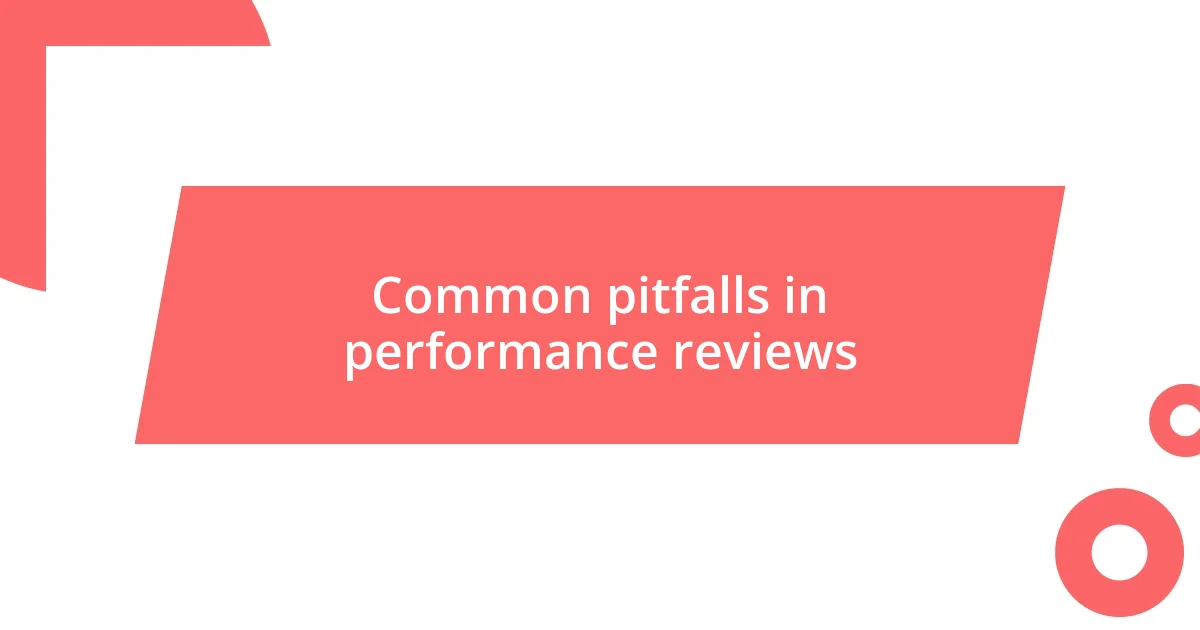
Common pitfalls in performance reviews
Performance reviews can often fall into predictable pitfalls that hinder their effectiveness. One of the most common mistakes I’ve seen is relying too heavily on subjective opinions without concrete evidence to back up assessments. For instance, when managers express opinions based on personal biases rather than objective metrics, it can lead to confusion and frustration for employees. I remember a colleague receiving a lukewarm review only because the manager didn’t appreciate their unique approach to problem-solving, despite it delivering excellent results.
Emphasis on negative aspects is another pitfall that can overshadow the positive contributions an employee has made. During one of my reviews, I found myself fixated on a couple of minor mistakes I had made, while my achievements were barely mentioned. This imbalance left me feeling undervalued, leading to diminished motivation. It’s crucial to create a balanced narrative during performance discussions that acknowledge both strengths and areas for improvement.
Lastly, a lack of follow-up can leave employees feeling lost after a review. I once finished a performance discussion and never had a chance to revisit the points raised. This absence of continued engagement hindered my growth and left me questioning the relevance of the feedback. Establishing a plan for check-ins can make a significant difference and clarify what success looks like moving forward.
| Common Pitfall | Impact |
|---|---|
| Subjective Opinions | Creates confusion and frustration |
| Overemphasis on Negatives | Leads to feelings of undervaluation |
| Lack of Follow-Up | Hinders growth and clarity |
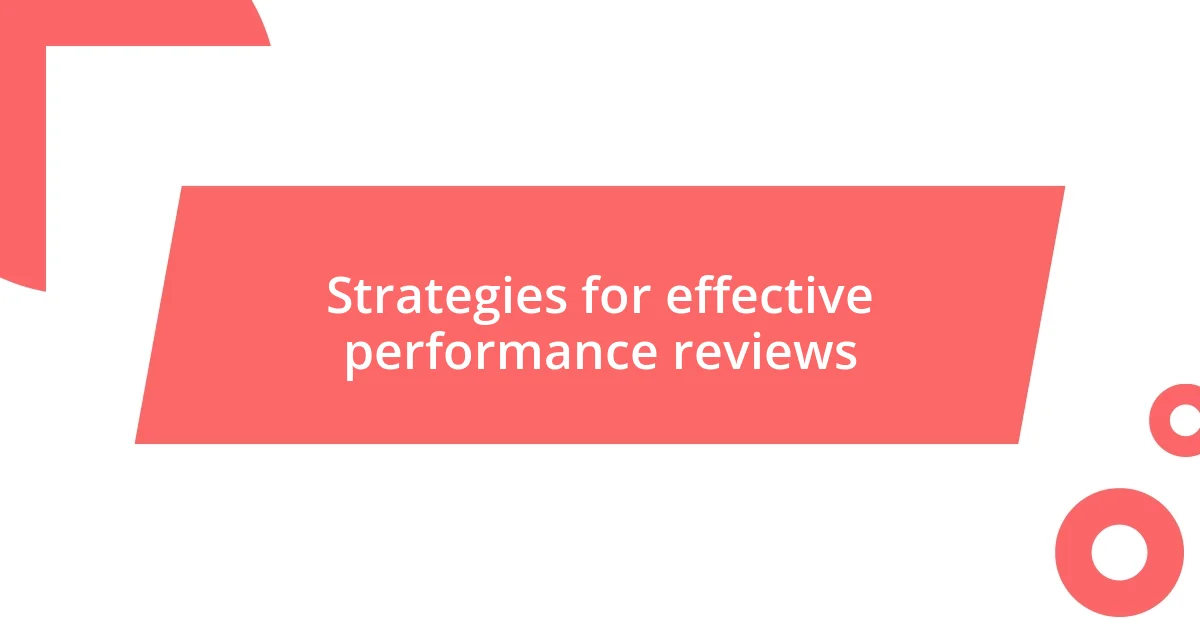
Strategies for effective performance reviews
To conduct effective performance reviews, I strongly believe in the importance of preparation. Before the meeting, I always gather specific examples of both successful projects and areas needing improvement. This approach not only gives me a clear narrative to present but also sets the stage for a more constructive dialogue. Have you noticed how details can transform a conversation? They make it much easier to discuss growth without it feeling like a personal attack.
Another strategy that has worked wonders for me is to create a supportive atmosphere during the review. I remember one particular session where we transformed the setting, meeting in a casual coffee shop instead of the usual conference room. This small change eased the tension and encouraged a more genuine conversation. Isn’t it interesting how even the environment can impact the tone and outcome of such discussions?
Lastly, I advocate for establishing clear action items post-review. In one of my past reviews, we developed a roadmap with specific goals and regular check-ins, allowing me to see my progress in real time. This not only kept me motivated but also reinforced accountability on both sides. How empowering is it to know there’s a plan in place? I’ve found that these strategies not only enhance the review process but also cultivate a more trust-filled relationship over time.
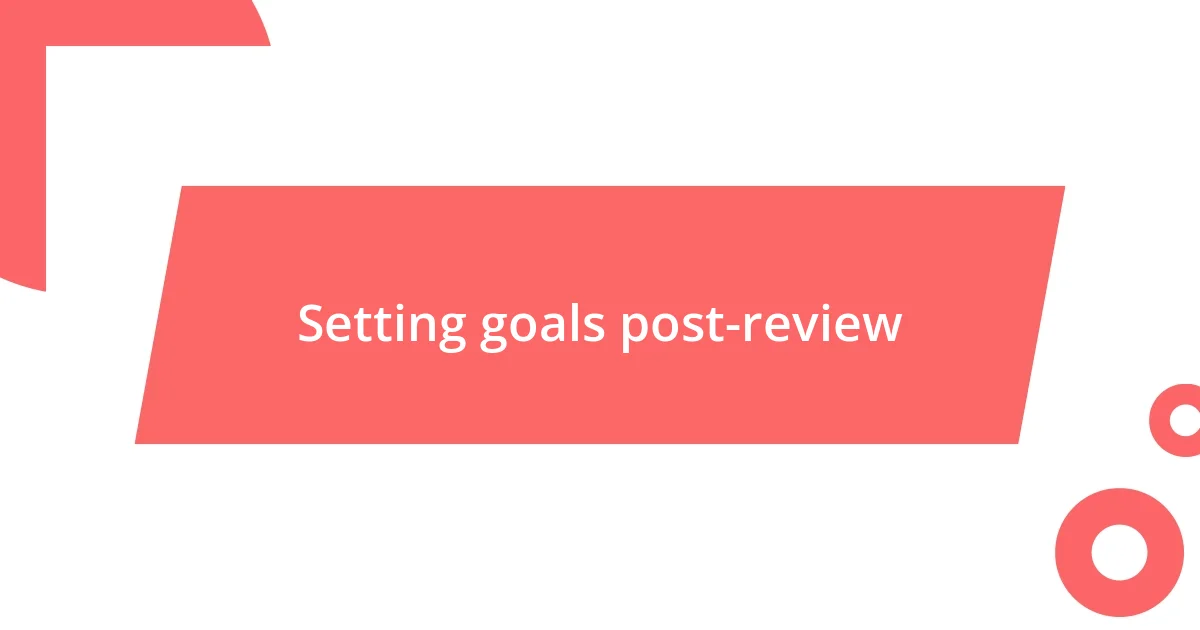
Setting goals post-review
Setting goals after a performance review is vital for future success. From my experience, collaborating with my manager to set distinct, measurable objectives ensures that I have a clear path forward. I remember feeling invigorated after a review where we outlined specific milestones, allowing me to focus my energies in a purposeful direction. Isn’t it fantastic when you leave a meeting with a tangible plan?
I’ve learned that revisiting those goals regularly creates valuable touchpoints for reflection. After one review, we decided to check in monthly to discuss progress. Those conversations not only kept me accountable but also revealed insights that we could adapt and refine. It was refreshing to know that my development was an ongoing conversation rather than a once-a-year event.
Moreover, making sure that these goals align with both my career aspirations and the company’s objectives creates a sense of shared purpose. I once set a goal to lead a team project that aligned with my passion for mentoring others. Achieving that felt incredibly rewarding and energized my commitment to the company. Can you recall a time when you set a goal that resonated deeply with you? The excitement of going after something that matters can dramatically enhance motivation and drive.
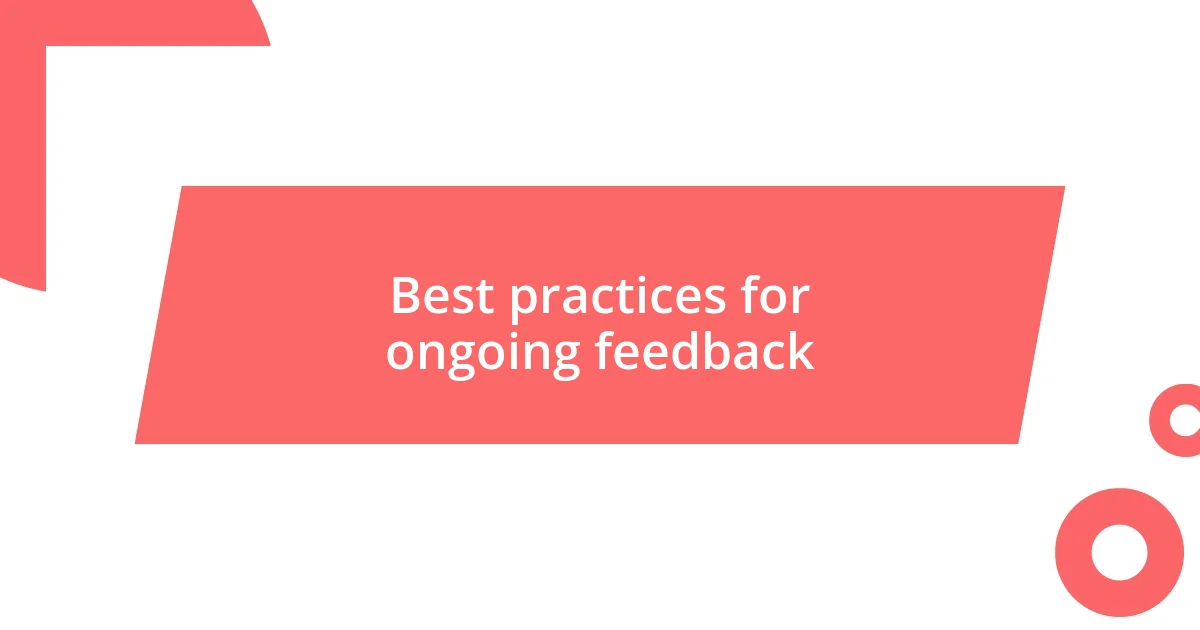
Best practices for ongoing feedback
Recognizing the importance of ongoing feedback has been a game-changer for me. I’ve found that regular touchpoints make it feel less daunting than waiting for a formal review. For instance, I once set aside five minutes each week to chat with my colleague about our projects, and it transformed our working dynamic. Doesn’t it seem simpler to address challenges in real-time rather than letting them fester?
One practice I cherish is the art of timely recognition. When I see a teammate excel, I make it a point to acknowledge their effort right away. There was this one time when a team member delivered a fantastic presentation, and I sent a quick note of praise. The joy in their response reminded me that a little acknowledgment can go a long way in boosting morale. Have you ever felt uplifted by a spontaneous compliment?
I also prioritize creating a two-way feedback culture, where sharing thoughts goes both ways. During a brainstorming session, I asked my teammates for their insights, and they provided perspectives I hadn’t considered. This exchange not only enriched our collaboration but also fostered a sense of community and trust. Can you think of a time when feedback from others led to a meaningful breakthrough for you? The connections forged in those moments are truly invaluable.










